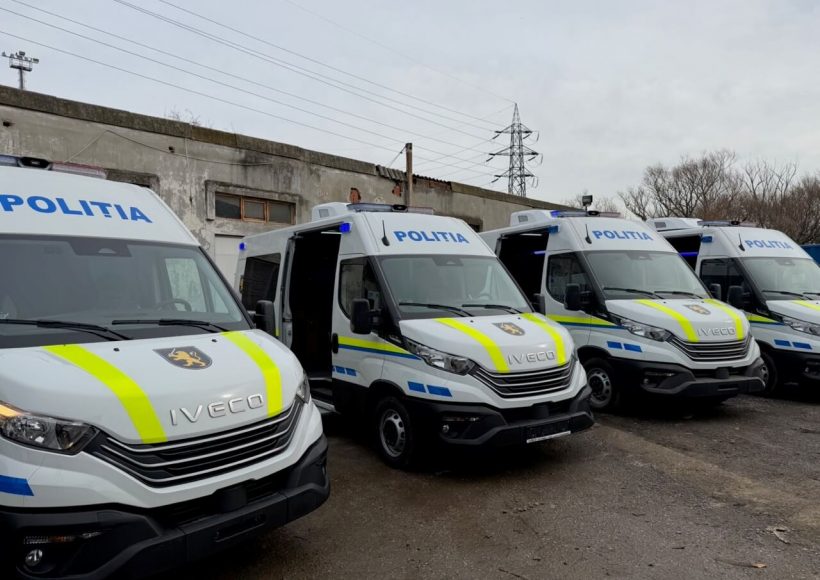The Mobile Police Stations for the General Police Inspectorate (GPI) of the Republic of Moldova have successfully completed final technical…
Fostering Security, Equality and Regional Stability
In Moldova, we focus on enhancing border security, empowering law enforcement, promoting gender equality in the security sector, and addressing explosive threats to foster long-term stability and resilience.
Comprehensive Security and Social Reform Initiatives in Moldova
As Moldova pushes forward on its path to stability and European integration, the GS-Foundation is playing a pivotal role in reshaping the country’s security landscape.
In partnership with the German Federal Foreign Office, we are tackling some of the most pressing challenges Moldova faces today: from strengthening its border security and empowering its National Police, to promoting gender equality within the security sector and addressing the dangers posed by unexploded ordnance.
Through innovative solutions and cutting-edge training programs, our projects are not just responding to the immediate security threats but are laying the groundwork for a safer, more resilient Moldova that aligns with European standards of governance and peace.
Table of Contents
Supporting Moldova’s Ministry of Internal Affairs in Capacity Building and Establishing a National Drone Competence Centre
Project Overview
- Goal: To strengthen the institutional capacity of Moldova’s Ministry of Internal Affairs and modernise its internal security structures in the field of digitalisation and project management. The project also supports the strategic development of national drone training guidelines for all civilian security agencies in line with international standards.
- Duration: 2025-2027
- Commissioning Party: German Federal Foreign Office (GFFO)
- Beneficiaries: Ministry of Internal Affairs Moldova
- Status: Ongoing
- Photos slideshow: GS-F, GPI, MIA
Why it Matters
As one of Europe’s most vulnerable countries, Moldova faces growing geopolitical uncertainty and significant economic challenges. Since becoming an EU candidate country, Moldova has prioritised internal reform and closer cooperation with European institutions. In this context, the modernisation of the Ministry of Internal Affairs (MIA) and the introduction of forward-looking technologies like drones are crucial.
By promoting institutional development and standardised capabilities across Moldova’s security agencies, the project contributes directly to stability, resilience, and Moldova’s EU integration goals.
Our Activities
The project implements a series of targeted activities designed to strengthen institutional project management capacity, promote standardisation across agencies, and enable long-term use of drone technologies in Moldova’s civilian security sector.
- Institutional Strengthening of the Ministry of Internal Affairs
To enable the MIA to lead strategically and manage international cooperation effectively, the project provides:
- English language training to strengthen communication with international partners
- Digital equipment and database integration to improve internal workflows
- Project management and public speaking training for staff taking on leadership roles
- Strategic on-site consulting by two long-term advisors to support the development of internal policies, manuals and procedures
- Promotion of international exchange to learn about best practice examples
- Standardising Drone Operations and Building a Competence Centre
The aim is to establish coordinated drone use across civilian security services based on shared rules and minimum training standards:
- A national kick-off workshop to align all stakeholders on strategic goals
- A joint inventory of all drones in use and definition of mission types
- A standardised basic drone curriculum at the Police Academy
- Procurement of training drones for hands-on instruction
- Train-the-trainer sessions for drone instructors, covering both basic and advanced training levels
- Mentored delivery of initial courses to ensure quality and confidence
- Ongoing development of institutional drone guidelines across agencies
- Positioning the Border Police as a Model Institution
To build on past collaboration and strengthen Moldova’s border security capabilities, the project supports:
- Image analysis training to extract tactical insights from drone footage
- Participation in European drone exchange formats to foster cross-border learning and cooperation for all Moldovan civil security authorities
Goals and Impact
The project helps Moldova develop a more modern, capable and networked internal security system. Through the MIA’s strengthened leadership role, the use of drones becomes a coordinated national asset rather than a fragmented tool.
By institutionalising training, setting quality standards and promoting international exchange, the initiative equips Moldova’s civilian security forces to respond more effectively to national and regional challenges—and brings the country a step closer to the European security community.
Strengthening the Moldovan National Police in Crisis Prevention and the Fight Against Crime
Project Overview
- Goal: Enhance the capacity of the Moldovan National Police to address security challenges and increase public trust
- Duration: 2024-2025
- Commissioning Party: German Federal Foreign Office (GFFO)
- Beneficiaries: National Police Moldova and the Ministry of Internal Affairs Moldova
- Status: Ongoing
- Photos slideshow: GS-F, GPI, MIA
Why it Matters
The Republic of Moldova, one of Europe’s poorest countries, is grappling with the economic consequences of the ongoing Russian aggression in Ukraine. Since electing a reform-oriented government in 2021, Moldova has focused on advancing economic development, judicial reform, security sector modernization, and improving living conditions. Moldova has been an EU candidate country since June 2022, and its government is committed to implementing reforms that foster public trust and promote international cooperation.
In 2023, the GS-Foundation initiated a project to strengthen Moldova’s National Police, achieving significant milestones, including:
- Enhancing analytical skills for police investigations and operations.
- Introducing intelligent technology in police vehicles to boost efficiency.
- Improving the handling, defusing, and transport of explosives.
- Strengthening institutional frameworks, particularly around gender equality.
- Providing strategic advice on securing EU funding for internal security.
Our Activities
This foundation has positioned the GS-Foundation as a trusted and reliable partner, paving the way for expanded collaboration in 2024-2025. Building on the successes of 2023, the current two-year project intensifies efforts to address Moldova’s immediate and long-term security needs.
Key activities include:
- Capacity Building: Further enhancing the analytical and operational skills of police officers, continuing to improve their ability to respond to crises and threats.
- Community-Oriented Policing: Deepening engagement with communities to promote trust and cooperation between citizens and law enforcement.
- Fighting Organized Crime: Expanding initiatives to combat organized crime, enhancing public safety, and increasing deterrence.
- Institutional Strengthening: Continuing to strengthen internal security structures, with a special focus on gender equality, leadership training, and initiatives to boost morale and job satisfaction among police officers.
- Technology Integration: Building on the 2023 success of integrating intelligent technologies, further equipping police with tools and training to handle explosives and other threats effectively.
- Strategic Advice: Extending advisory support to secure EU funding for internal security initiatives and develop long-term strategies that align with Moldova’s EU accession goals.
Goals and Impact
This project aims to build a modern, community-focused police force equipped to handle complex security challenges. By leveraging the achievements of 2023, the GS-Foundation is enabling the Moldovan National Police to make meaningful progress in combating crime, ensuring public safety, and earning the trust of citizens. These efforts directly contribute to Moldova’s stability, resilience, and its path toward European integration
Stefan Feller as COO on site to discuss the project, including a meeting with the Minister of the Interior
First management and project management training courses for the security authorities begin
EU trip for the EU accession negotiations to the European institutions in Brussels
EQUALFORCE: Promoting Gender Equality and Women in Security Services in Moldova and Ukraine
Project Overview
- Goal: Strengthen gender equality within the security agencies of Ukraine and Moldova by enhancing their capacity to address gender-based violence, integrating women into leadership roles, and fostering a culture of inclusivity and cooperation.
- Duration: 2024– 2025
- Comissioning Party: German Federal Foreign Office (GFFO)
- Beneficiaries: Ministries of Interior and Security Services in Moldova and Ukraine, Civil Society Organisations
- Status: Ongoing
Why it Matters
Gender equality in security services is crucial for promoting sustainable peace, human security, and democratic development. In Ukraine and Moldova, efforts to align with EU standards necessitate reform processes that integrate gender perspectives in decision-making and institutional practices.
In Ukraine, the war has highlighted gender-specific challenges, such as discrimination and inequalities, both within the security sector and the civilian population. Addressing these challenges is essential for creating a resilient and inclusive security framework. Moldova, building on earlier project successes, aims to deepen its reform efforts to ensure a gender-sensitive security sector that aligns with European aspirations.
By tackling systemic barriers, improving working conditions for women, and addressing sexual and gender-based violence (SGBV), the project contributes to stronger, more equitable institutions capable of fostering public trust and stability.
Our Activities
Building on previous initiatives, the EQUALFORCE project supports Ukraine and Moldova through targeted actions at multiple levels:
Political Level
- Strengthening networks and dialogues on Women, Peace & Security (WPS) and security sector reform (SSR) among national and regional actors.
- Promoting local ownership of gender-sensitive reforms and sharing best practices to combat discrimination and SGBV.
Institutional Level
- Building capacities within state security institutions to integrate gender equality in policy and practice.
Supporting reforms to increase women’s leadership opportunities and decision-making roles in the security sector.
Partnership Level
- Encouraging collaboration between law enforcement agencies and civil society to enhance trust and accountability.
- Developing synergies between the GS-Foundation and international organisations for coordinated efforts.
Operational Level
- Delivering training programmes on investigating SGBV, gender equality, and leadership for security personnel.
- Providing technical assistance, including gender-appropriate uniforms, family-friendly workspaces, and specialized interview facilities.
- Hosting roundtable discussions to share knowledge and best practices on gender-responsive security sector reform.
Goals and Impact
The EQUALFORCE project aspires to transform security institutions in Ukraine and Moldova into models of gender-sensitive, inclusive governance capable of addressing complex societal challenges. By advancing women’s leadership, addressing sexual and gender-based violence (SGBV), and embedding a gender perspective into institutional frameworks, the initiative strengthens operational efficiency and fosters accountability within security services.
This approach builds trust between law enforcement agencies and the communities they serve, creating safer and more cohesive societies. Furthermore, the project supports Ukraine and Moldova in aligning with European Union standards for gender equality and democratic governance, advancing their aspirations for closer European integration.
Ultimately, EQUALFORCE contributes to the development of inclusive and resilient security systems that not only enhance stability but also promote sustainable peace, equality, and long-term development across the region.
Joint visit by delegations to the European Police Congress
Handover event for the delivery of female body armour
Training in the area of sexual harassment is starting for the first time
Follow-up training for last year's project is starting, with the official handover of the trainer's manual for the area of gender
Joint study trip to Munich and Berlin for a strategic exchange on the topic of domestic violence
Projects Completed
Contribution to improving aerial surveillance of the Moldovan border with the Border Police
Contribution to improving aerial surveillance of the Moldovan border with the Border Police
Project Overview
- Goal: Expand and enhance operational border surveillance in Moldova.
- Duration: 2023-2024
- Commissioning Party: German Federal Foreign Office (GFFO)
- Beneficiaries: Border Police Moldova and the Ministry of Internal Affairs Moldova
- Status: Finished
Why it Matters
Moldova’s strategic position, bordering Ukraine and Transnistria, places it at the heart of critical security issues such as illegal arms smuggling and human trafficking. In this context, modern and integrated border surveillance is crucial for mitigating these threats, ensuring national security, and supporting Moldova’s ambitions for closer ties with the European Union.
The Republic of Moldova faces a multitude of crises stemming from the Russian war of aggression. These include destabilization risks, new security threats such as illegal migration and the spread of weapons and explosives, and a significant strain on resources due to EU accession preparations. In addition, Moldova continues to grapple with complex social and security challenges. Strengthening the Moldovan National Police is critical to improving internal security, promoting public confidence, and preparing for EU integration.
In the wake of the Russian invasion of Ukraine, Moldova faces new security challenges, including an increase in migration and the risk of the uncontrolled distribution of weapons. Moldova’s border, which stretches over 1,900 km, including borders with Romania and Ukraine, requires enhanced surveillance to prevent the illegal movement of arms, drugs, and human trafficking.
Our Activities
This project aims to improve Moldova’s border security by integrating advanced technological solutions for monitoring and analysis. The use of unmanned aerial vehicles (UAVs) and satellite imagery will form the backbone of an advanced border surveillance system.
Key activities include:
- Advising the Moldovan Border Police: Assisting in planning and establishing an Aerial Monitoring Unit (AMU) to centralize and optimize operational control.
- Procurement and Equipment: Supplying the AMU with the latest IT technology, UAVs, and secure data storage systems.
- Training Personnel: Providing training to UAV operators, imagery analysts, and command staff in the acquisition, processing, and analysis of surveillance data while ensuring compliance with data protection standards.
- Integration of Satellite Imagery: Incorporating satellite imagery from the European Union’s SATCEN into the AMU system to enhance real-time monitoring capabilities.
- Counteracting Criminal Activities: Developing countermeasures to prevent criminals from using UAVs for counter-reconnaissance, and equipping UAV teams with anti-drone technology.
Goals and Impact
By implementing this project, Moldova will significantly enhance its ability to monitor its borders and respond to security threats. This integrated system, which combines UAV and satellite surveillance, will strengthen Moldova’s capacity to combat cross-border smuggling and human trafficking, ensuring greater stability and security for its citizens. This project will also contribute to Moldova’s ongoing efforts to align with European security standards and facilitate its integration into the European Union.
Completed assessments and consulting on the structure of the air monitoring unit and the IT infrastructure
Delivery and installation of the IT software for the air monitoring unit
Secure MU: Enhancing Security Through Explosive Ordnance Disposal (EOD) in Moldova and Ukraine
Secure MU: Enhancing Security Through Explosive Ordnance Disposal (EOD) in Moldova and Ukraine
Project Overview
- Goal: Strengthen the capabilities of security authorities in Moldova and Ukraine in explosive ordnance disposal (EOD) to mitigate threats, improve responder safety, and align operations with rule-of-law principles.
- Duration: 2024
- Commissioning Party: German Federal Foreign Office (GFFO)
- Beneficiaries: National Police Moldova and the Ministry of Internal Affairs Moldova
- Status: Finished
Why it Matters
Moldova and Ukraine face critical challenges from mines and explosive remnants of war, which pose significant risks to civilians, hinder economic development, and strain security institutions.
In Moldova, mines from the 1990s conflict, particularly in the Transnistria region, continue to endanger local populations and obstruct economic progress. The country’s explosive ordnance disposal (EOD) capabilities are limited, requiring urgent investment to effectively address these threats.
Ukraine, heavily affected by ongoing Russian aggression, is now the most mined country in the world, with areas twice the size of Austria contaminated. By early 2024, over 1,100 civilians had lost their lives to mines. These explosive hazards exacerbate the humanitarian crisis and create long-term barriers to economic recovery and social development.
Given their shared geography and operational similarities, both countries have an opportunity to collaborate on EOD advancements. International support and cross-border knowledge exchange are essential to mitigating these threats, protecting lives, and restoring regional security.
Our Activities
Expanding EOD Capacities in Moldova
This component focuses on enhancing Moldova’s National Police capabilities in explosive ordnance disposal (EOD), building on assessments and groundwork established in 2023. Activities include:
- Delivering advanced EOD training, including first-aid courses tailored for handling explosives.
- Participating in international platforms, such as the BKA Symposium, to foster knowledge exchange.
- Hosting regional workshops to deepen technical expertise and promote collaboration.
- Procuring a tactical robot (aunav.NEO HD) to enhance operational efficiency and safety.
- Updating assessments to refine strategic planning for future interventions.
Strengthening EOD Capacities in Ukraine
This component supports Ukraine’s National Guard by addressing the acute challenges posed by ongoing conflict and explosive threats. Activities include:
- Conducting a detailed needs assessment to evaluate current EOD capacities and gaps.
- Providing advanced training in risk assessment, detection, and the safe disposal of explosives.
- Facilitating joint training sessions with Moldovan counterparts to promote regional expertise-sharing.
- Procuring specialized protective gear, including demining suits (CLDS 450) and advanced helmets (DHV6.4).
These outputs aim to establish well-equipped, highly skilled EOD units in both countries, ensuring readiness to address explosive threats and improve civilian safety.
Goals and Impact
The SECURE-MU project aims to significantly strengthen the explosive ordnance disposal capabilities in Moldova and Ukraine, contributing to the safety of civilians and the stability of the region. By enhancing the technical and operational skills of EOD units, the project will ensure that these teams are well-equipped to effectively address the growing threats posed by mines and unexploded ordnance.
In Moldova, the project will help create a more robust and responsive EOD capacity, enabling quicker and more effective responses to explosive threats. This will enhance public safety, support regional stability, and contribute to Moldova’s broader security objectives, including European integration.
For Ukraine, the project addresses the urgent need for specialized EOD training and equipment to cope with the severe mine contamination caused by the ongoing conflict. By strengthening Ukraine’s ability to clear mines and secure affected areas, the project will play a critical role in protecting civilian lives, enabling the return of displaced populations, and facilitating long-term recovery and development.
Overall, the project will have a lasting impact on the security and well-being of both countries, providing them with the necessary resources, knowledge, and operational capacity to confront explosive threats, improve humanitarian conditions, and foster greater international cooperation in addressing common security challenges.
First aid course in Moldova for police officers dealing with explosive substances
Joint training programme for Ukraine and Moldova in Germany
Training in the area of sexual harassment is starting for the first time
Our dedicated team




GS-F News
from Moldova
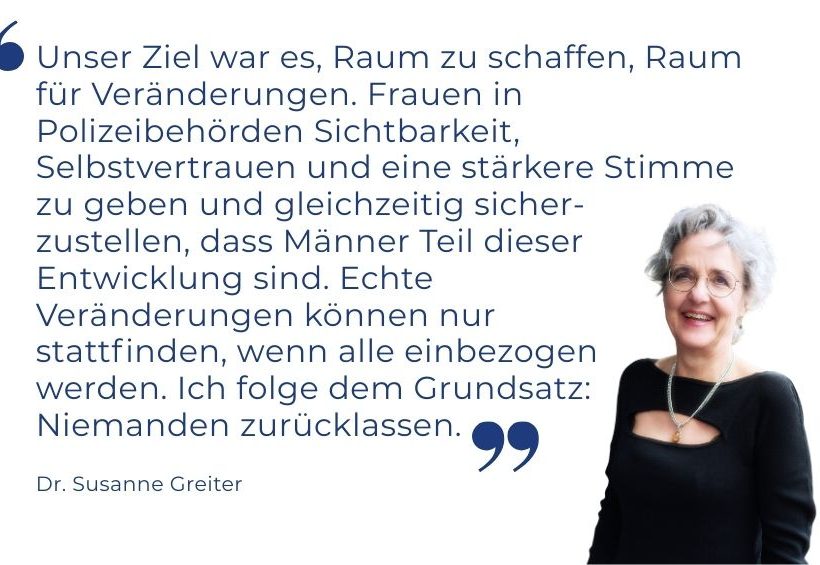 CategoriesInside GS-F Moldova
CategoriesInside GS-F Moldova EQUALFORCE Receives Global Outstanding Security Performance Award
On Tuesday, 10 February, we had the opportunity to attend a local Security Council / Community Policing meeting in Geamăna,…
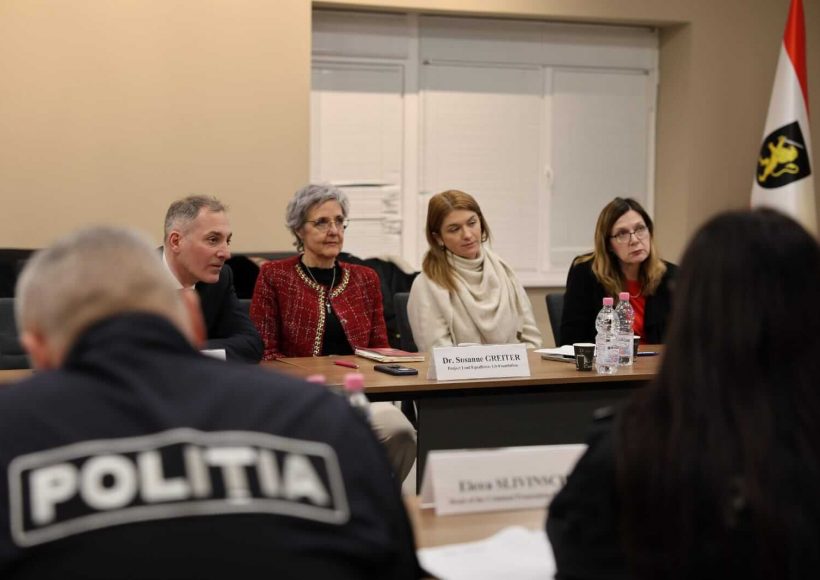 CategoriesMoldova
CategoriesMoldova From Policy to Practice: Mapping Moldova’s Response to Domestic Violence
Effective responses to domestic violence depend not only on laws and policies, but on how institutions interact in practice. Understanding…
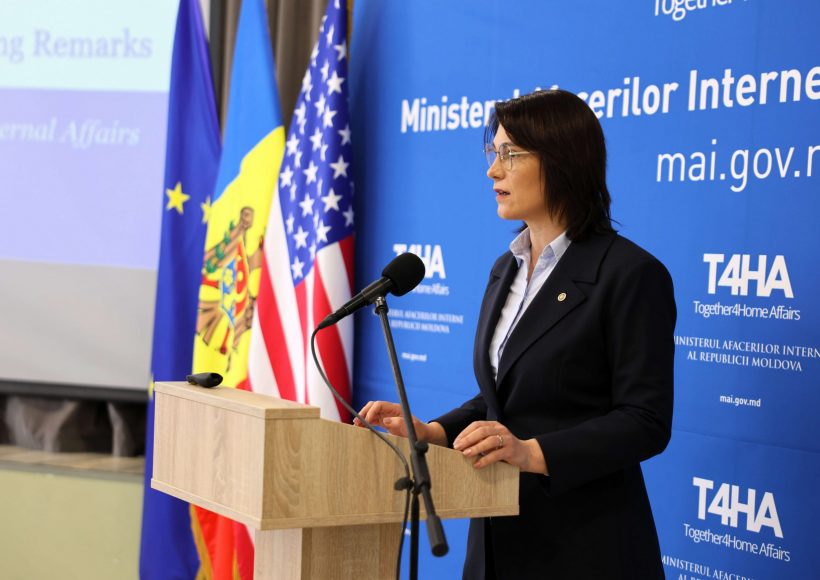 CategoriesMoldova
CategoriesMoldova Together4Home Affairs Council: Moldova Strengthens Institutional Resilience in Internal Affairs
Moldova’s internal affairs sector is moving from crisis management towards long-term institutional resilience. This transition framed the Together4Home Affairs Council…
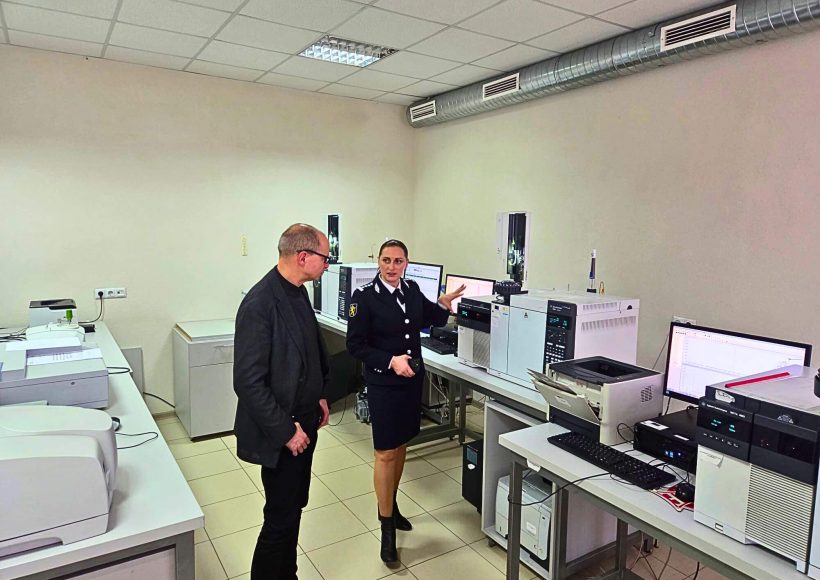 CategoriesMoldova
CategoriesMoldova Giving a boost to effective criminal investigations in Moldova
Enhancing forensic laboratory capacities is a key element of effective criminal investigations and well-functioning justice systems.
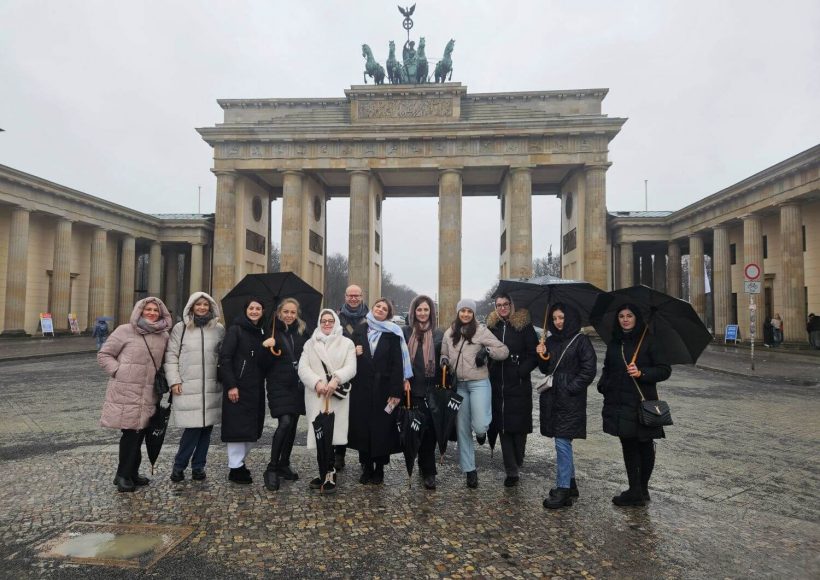 CategoriesMoldova
CategoriesMoldova International professional exchange: Moldovan police press officers in Berlin
Two weeks ago today, a professional programme began in Berlin that addressed a key question: How can professional police communication…

